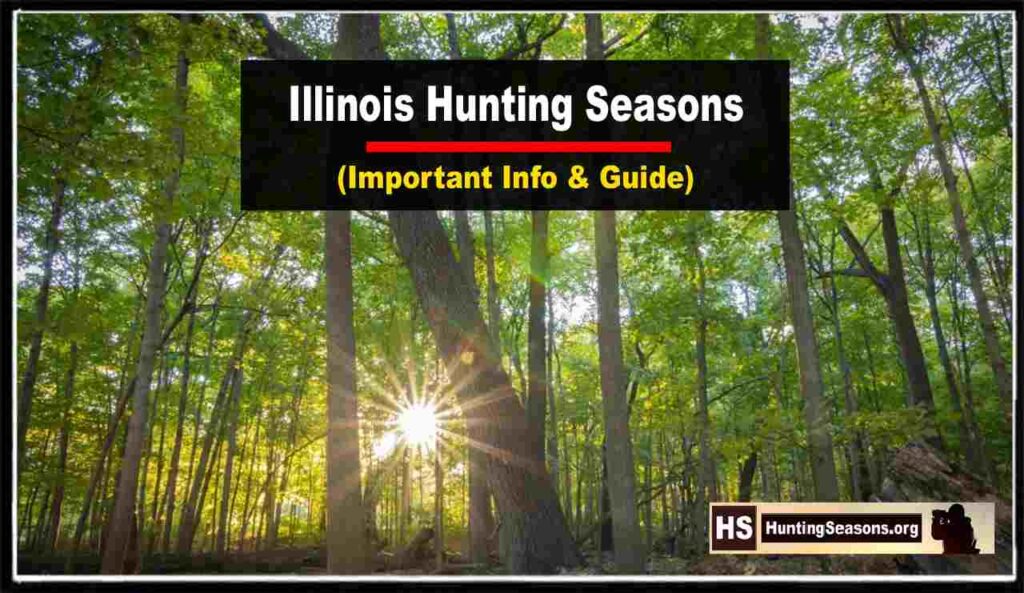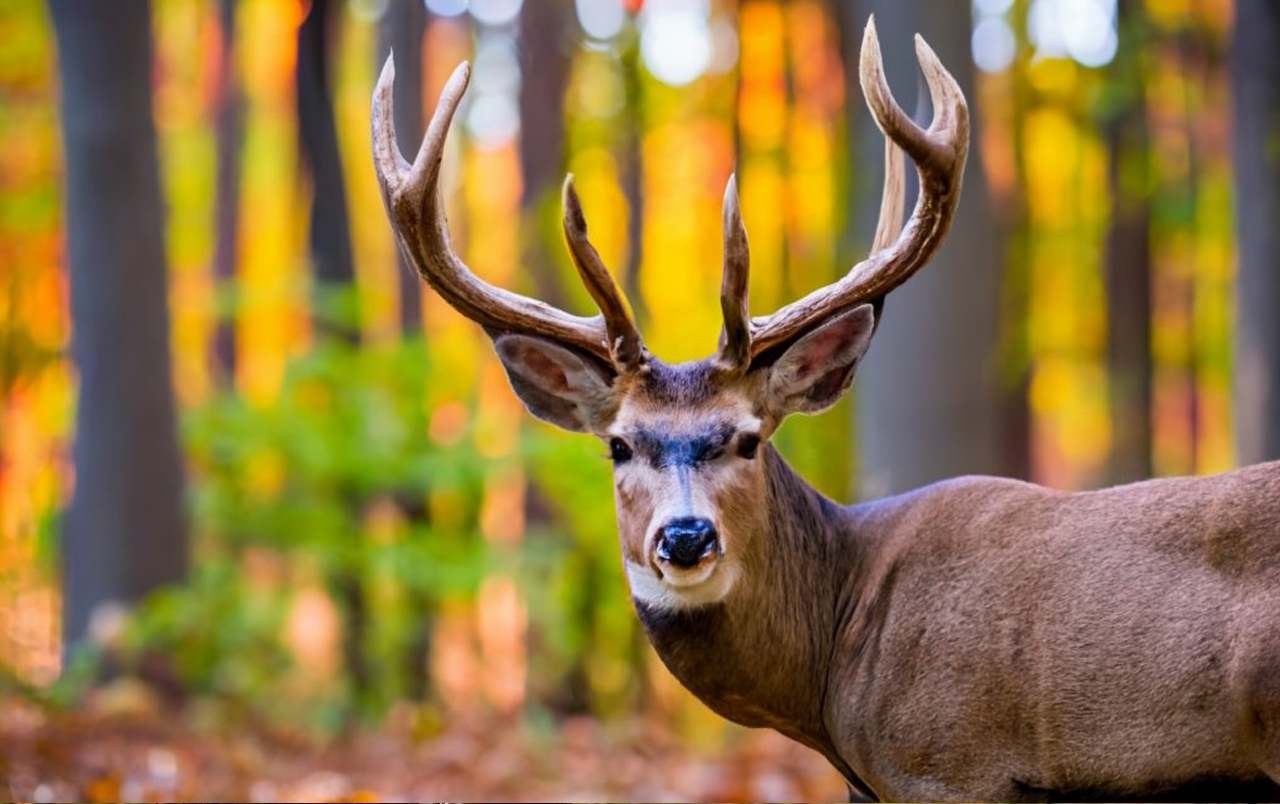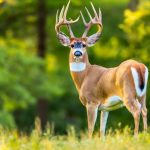The 2024 wildlife pursuit times provide exciting opportunities for outdoor lovers and sportsmen in the Prairie State’s stunning surroundings. Various enthusiasts visit this location for its rich wildlife species and plentiful outdoor activities. We will go over licensing requirements, wildlife pursuit schedules, game variety, and outdoor experience advice on this page.
Illinois Hunting Seasons
Our thorough guide to US Wildlife Pursuit Periods By State provides all the necessary information. You may hunt turkeys, rabbits, and many small game species during the two seasons. Residents and nonresidents may easily get a game license online. Some small game hunts don’t need a permit, making this outdoor activity more accessible.
Opening Dates for Key Game Animals
| Game Animal | Opening Dates |
|---|---|
| Deer (Archery) | 1-Oct |
| Deer (Firearms) | 17-Nov |
| Fox and Gray Squirrels | 1-Aug |
| Rabbit | 4-Nov |
| Turkey (Archery) | 1-Oct |
| Turkey (Shotgun) | 21-Oct |
| Canada Geese | 1-Sep |
| Pheasant and Quail | 4-Nov |
| Duck | 28-Oct |
Deer
| Firearm (Shotgun, Centerfire Rifle, Muzzleloader, Handgun) | 22-24 Nov & 5-8 Dec 2024 | One deer per firearm permit |
| Muzzleloader only | 13-15 Dec 2024 | One deer per muzzleloader permit |
| Special CWD | 26-29 Dec 2024 & 17-19 Jan 2025 | One deer per valid permit |
| Late-Winter Antlerless-only (Shotgun, Muzzleloader, Handgun) | 26-29 Dec 2024 & 17-19 Jan 2025 | One antlerless deer per permit |
| Youth Firearm | 12-14 Oct 2024 | One deer |
| Archery (Counties with a firearm season and west of Route 47 in Kane County) | 1 Oct – 21 Nov & 25 Nov – 4 Dec & 9 Dec 2024 – 19 Jan 2025 | One deer per archery permit |
| Archery (Cook, DuPage, Lake and Kane [east of route 47] Counties) | 1 Oct 2024 – 19 Jan 2025 | One deer per archery permit |
Crow
- 28-Oct – 28-Feb
Dove
| Dove (Daily bag limit 15) | Start | End |
| (Early) | 1-Sep | 14-Nov |
| (Late) | 26-Dec | 9-Jan |
Rabbits & Squirrel
| Species | Dates |
| Squirrels (Fox and Gray) | 1 Aug 2024 – 15 Feb 2025; Closed 22-24 Nov and 5-8 Dec 2024 in counties open for firearm deer hunting |
| Rabbits (Cottontail and Swamp) | 2 Nov 2024 – 15 Feb 2025 |
Furbearer
| SPECIES | OPEN DATES | CLOSED DATES |
| Coyote | Year-round | Nov 22-24 and Dec 5-8, 2024 |
| Striped Skunk | Year-round | Nov 22-24 and Dec 5-8, 2024 |
| Raccoon | Nov 10, 2024 – Feb 15, 2025 | Nov 22-24 and Dec 5-8, 2024 |
| Opossum | Nov 10, 2024 – Feb 15, 2025 | Nov 22-24 and Dec 5-8, 2024 i |
| Fox (Red and Gray) | Nov 10, 2024 – Feb 15, 2025 | Nov 22-24 and Dec 5-8, 2024 |
| Bobcat | Nov 10, 2024 – Feb 15, 2025 | Nov 22-24 and Dec 5-8, 2024 |
| Woodchuck (Groundhog) | Jun 1, 2024 – Mar 31, 2025 | Nov 22-24 and Dec 5-8, 2024 |
Pheasant, Partridge & Quail
| Start | End | |
| (North) | 2-Nov | 8-Jan |
| (South) | 24-Nov | 15-Jan |
Rabbit
- 4-Nov – 15-Feb
IL Waterfowl Season
| Species | North Zone Dates | Central Zone Dates | South Central Zone Dates | South Zone Dates |
| Teal (early season) | Sep 7 – Sep 22, 2024 | Sep 7 – Sep 22, 2024 | Sep 7 – Sep 22, 2024 | Sep 7 – Sep 22, 2024 |
| Rails (Sora & Virginia) | Sep 7 – Nov 15, 2024 | Sep 7 – Nov 15, 2024 | Sep 7 – Nov 15, 2024 | Sep 7 – Nov 15, 2024 |
| Snipe (Wilson’s) | Sep 7 – Dec 22, 2024 | Sep 7 – Dec 22, 2024 | Sep 7 – Dec 22, 2024 | Sep 7 – Dec 22, 2024 |
| Ducks | Oct 19 – Dec 17, 2024 | Oct 26 – Dec 24, 2024 | Nov 16, 2024 – Jan 14, 2025 | Nov 30, 2024 – Jan 28, 2025 |
| Scaup | Oct 19 – Dec 2, 2024 (2/day) | Oct 26 – Dec 9, 2024 (2/day) | Nov 16 – Dec 30, 2024 (2/day) | Nov 30, 2024 – Jan 13, 2025 (2/day) |
| Dec 3 – Dec 17, 2024 (1/day) | Dec 10 – Dec 24, 2024 (1/day) | Dec 31, 2024 – Jan 14, 2025 (1/day) | Jan 14 – Jan 28, 2025 (1/day) | |
| Mergansers | Oct 19 – Dec 17, 2024 | Oct 26 – Dec 24, 2024 | Nov 16, 2024 – Jan 14, 2025 | Nov 30, 2024 – Jan 28, 2025 |
| Coots | Oct 19 – Dec 17, 2024 | Oct 26 – Dec 24, 2024 | Nov 16, 2024 – Jan 14, 2025 | Nov 30, 2024 – Jan 28, 2025 |
| Canada Geese (early season) | Sep 1 – Sep 15, 2024 | Sep 1 – Sep 15, 2024 | Sep 1 – Sep 15, 2024 | Sep 1 – Sep 15, 2024 |
| Canada Geese (regular season) | Oct 19, 2024 – Jan 16, 2025 | Oct 26 – Nov 3, 2024 & Nov 12, 2024 – Jan 31, 2025 | Nov 16, 2024 – Jan 31, 2025 | Nov 30, 2024 – Jan 31, 2025 |
| Light Geese | Oct 19, 2024 – Jan 16, 2025 | Oct 26, 2024 – Jan 31, 2025 | Nov 16, 2024 – Jan 31, 2025 | Nov 30, 2024 – Jan 31, 2025 |
| Brant | Oct 19, 2024 – Jan 16, 2025 | Oct 26, 2024 – Jan 31, 2025 | Nov 16, 2024 – Jan 31, 2025 | Nov 30, 2024 – Jan 31, 2025 |
| White-fronted Geese | Oct 21, 2024 – Jan 16, 2025 | Nov 5, 2024 – Jan 31, 2025 | Nov 16, 2024 – Jan 31, 2025 | Nov 30, 2024 – Jan 31, 2025 |
| Conservation Order Light Geese | Jan 17 – Apr 30, 2025 | Feb 1 – Apr 30, 2025 | Feb 1 – Apr 30, 2025 | Feb 1 – Apr 30, 2025 |
| Youth Waterfowl | Oct 12-13, 2024 | Oct 19-20, 2024 | Nov 9-10, 2024 | Nov 16-17, 2024 |
Turkey
| Season | Segment | Dates (Inclusive) |
| Spring 2024 | 1 | North Zone: 15-19 Apr |
| South Zone: 8-12 Apr | ||
| 2 | North Zone: 20-25 Apr | |
| South Zone: 13-18 Apr | ||
| 3 | North Zone: 26 Apr-1 May | |
| South Zone: 19-24 Apr | ||
| 4 | North Zone: 2-8 May | |
| South Zone: 25 Apr-1 May | ||
| 5 | North Zone: 9-16 May | |
| South Zone: 2-9 May | ||
| Youth Spring | 30-31 Mar and 6-7 Apr 2024 | |
| Fall (shotgun) | 19-27 Oct 2024 | |
| Fall (archery) | 1 Oct 2024 – 19 Jan 2025 |
Woodchuck
| Start | End |
| 1-Jun | 31-Mar |
| 21-Oct | 3-Dec |
IL Waterfowl
| Type of Waterfowl | Dates | Daily Bag Limit | Possession Limit |
| Early Canada Goose | Statewide: Starting September 9 | North & Central: 5 | South & South-Central: 2 |
| Teal | Statewide: Starting September 9 | 6 (combined teal species) | 18 |
| Rail (Sora & Virginia) | September 9 – November 17 | 25 | 75 |
| Snipe | September 9 – December 24 | 8 | 24 |
| Regular Duck | North: October 21, Central: October 28, South-Central: November 11, South: December 2 | ||
| Canada Goose | North: October 21, Central: October 28, South-Central: November 11, South: December 2 | ||
| Snow Goose | North: October 21, Central: October 28, South-Central: November 11, South: December 2 | ||
| White-Fronted Goose (Specklebelly) | North: October 23, Central: November 5, South-Central: November 11, South: December 2 |
Licenses
| License | Resident Fees | Non-Resident Fees |
|---|---|---|
| Hunting Apprentice License | $7.50 | |
| Youth Hunting and Trapping Combo License | $7.50 | |
| Non-Resident Hunting License | $57.75 | |
| Non-Resident Hunting License (5 day) | $35.75 | |
| Non-Resident Hunting Preserve License | $12.50 | |
| Resident Hunting License | $12.50 | |
| Resident Lifetime Hunting License | $360.00 | |
| Resident Lifetime Sportsmen's Combo License | $765.00 | |
| Resident Senior Hunting License | $6.50 | |
| Resident Senior Sportsmen's Combo License | $13.50 | |
| Resident Sportsmen's Combo License | $26.25 | |
| Resident Super Senior Hunting License | $1.50 | |
| Resident Super Senior Sportsman Combo License | $2.75 | |
| Resident Veteran Hunting License | $6.50 | |
| Resident Veteran Sportsmen's Combo License | $13.50 | |
| Non-Resident Trapping License (with state reciprocity) | $175.50 | |
| Non-Resident Trapping License (without state reciprocity) | $250.50 |

Regulations
- One deer per permit throughout the deer shooting season. Youth, archery, firearm, and muzzleloader hunters may kill only two antlered yearly.
- Clothing: All rifle games require individuals to wear a solid blaze orange or pink cap/hat and upper outer clothing with at least 400 square inches of the same color. Specific criteria apply when following injured deer with a dog or accompanying juvenile rifle pursuers.
- Tree Stand Restrictions: IDNR-managed locations allow one tree stand or ground blind per hunter. Tree stands that cut or puncture the bark are illegal. Tree stands must be relocated every day unless otherwise stated.
- Non-resident individuals who shoot a wild deer in Illinois must contact the state wildlife agency in the states they will travel through to learn about corpse possession and transit rules. State laws differ.
- Deer taken during certain seasons must be recorded by 10 pm the same day. A toll-free phone or online check-in system can achieve this. In non-CWD surveillance counties, temporary harvest tags must include the harvest confirmation number. CWD monitoring counties need leg tags for the harvest.
- Shotguns with slugs, single or double-barreled muzzleloading rifles, and centerfire revolvers or single-shot pistols are legal for firearm/muzzleloader . Muzzleloaders must utilize black powder or certified alternatives and particular igniting systems.
- Shotguns and muzzleloaders must use. 44-caliber projectiles. Handguns must use.30-caliber or larger bottleneck or straight-walled centerfire cartridges with particular energy requirements. It allows only soft points or expanding bullets.
- Firearm require a valid Firearm Deer Permit or Property-only Landowner/Tenant Permit. For that year’s firearm period, muzzleloading rifle require a valid permit or an unused Property-Only Landowner/Tenant permit. County-specific CWD Permits are also available.
- Mandatory Firearm Harvest Reporting and Transportation: In counties with Chronic Wasting Disease (CWD) monitoring, successful firearm season hunters must transport their harvest to a check station on the day they killed it. Deer get permanent harvest tags. If the deer is not checked-in by 8 pm, other arrangements apply.
- Special CWD: Certain counties allow hunting and harvest reporting is done electronically by phone or online registration. These counties need CWD Deer Permits to hunt.
- Special Harvest Regulations: Individuals with unfulfilled permits from the past rifle, youth, or muzzleloader seasons may only harvest the deer stated on the license. Antlered limitations do not apply during CWD season.
- Licensing and Permits: Residents and non-residents require a license, a state habitat stamp, and a turkey permit to hunt turkey.
- Turkey is allowed with shotguns in the 20–10 gauge range. Non-Firearm Concealed Carry Act guns are forbidden. Archery requires long, recurved, or compound bows with a minimum pull of 30 pounds and crossbows with 125 pounds.
- Harvest Limits and Tagging: Each lawfully issued permit allows individuals to harvest one wild turkey, which must be tagged immediately after killing. The turkey’s leg tag should stay on until it’s checked at the hunter’s home.
- Decoys and Attractants: Turkey hunters cannot employ live or electronic baits, dogs, or recorded sounds. Baiting or harvesting turkeys is unlawful. Agriculture, food plots, and standing crops may be manipulated.
- Turkey Harvest Reporting: Individuals must report their turkey harvest by 10 pm the same day. Call a toll-free hotline or check-in online. Hunters must write their confirmation number on the leg tag.
- Turkey hunting permits, lotteries, and over-the-counter purchases are available. Residents may apply for three permits during specified seasons. Licenses are limited by availability and season.
- The state has three duck zones: North, Central, and South. Roadways, waterways, and state borders define zones.
- Geese Zones: Like duck, it has four geese zones: North, Central, South, and South Central. These zones match duck zones.
- Credentials: Residents and non-residents require a hunting license, State Waterfowl Stamp, Federal Waterfowl Stamp, and HIP Certification (National Migratory Bird Harvest Information Program) to hunt migratory waterfowl. Regulations may provide exemptions.
- Federal Migratory Bird Hunting & Protection Stamp: Must buy a Federal Duck Stamp, often known as the Migratory Waterfowl Stamp, to support habitat protection. The $25 stamp has protected millions of acres of natural habitat countrywide.
- The Illinois Migratory Waterfowl Stamp is required in addition to the Federal Duck Stamp. Stamp sales help preserve and acquire waterfowl, wetland habitats, and game sites.
- HIP Registration: All licensed hunters wishing to pursue migratory game birds, including waterfowl, must register with HIP yearly. Call the number or register while buying a hunting or sportsman license. Lifetime licensees must register yearly. Waterfowl need HIP registration.
Frequently Asked Questions
When is Illinois hunting season ?
It is slated to run from September 1 to January 31. The state provides various options for those who like the great outdoors, whether looking for deer, waterfowl, upland game, or other species.
What types of games can be hunted in Illinois?
There are two distinct period: one for guns and one for archery. For small games, such as rabbits, squirrels, and ducks, is permitted year-round, but bag restrictions and shooting hours must be followed. These possibilities provide individuals with various wildlife to chase and enjoy throughout the year.
What are the requirements for hunting in Illinois?
A habitat stamp and a valid game license are two main requirements. A current firearm safety certificate is also required to use a firearm during your outdoor expedition. You may easily acquire these permits and stamps online at your neighborhood sporting goods shop or any (IDNR) office.
Can I hunt with a firearm during the archery season in Illinois?
The laws governing firearm games during the archery season might change. To find out whether you may hunt your preferred game species with a firearm during the archery season, it is crucial to read the IDNR’s detailed rules and restrictions carefully.
Can non-residents hunt in Illinois during the season?
Yes, non-residents may usually hunt in Illinois, but only if they have the necessary hunting licenses and permits. The cost of non-residents’ permits and licenses may differ from that of resident licenses. For comprehensive details on non-resident laws and permits, see the IDNR website.
- New Jersey Hunting Seasons 2024 New Dates & Regulations - September 15, 2024
- Delaware Hunting & Trapping Seasons Summary 2024 - September 4, 2024
- 2024-2025 Colorado Hunting: New Big Game Season Dates! - August 28, 2024





